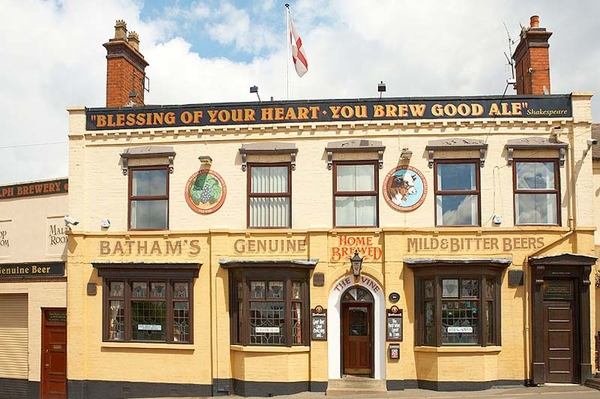Historic mild ales need urgent support
Added: Monday, December 30th 2019

With all the sound and fury in recent years about “craft beer” and whether cask ale can be included under that umbrella, it warms the proverbial cockles to find long-established brewers quietly going about the business of simply producing good beer.
Two of the finest practitioners of the brewers’ art are the much-loved Black Country ale makers, Bathams and Holdens. Both Tim Batham and Jonathan Holden have pubs in the Dudley area and could be in head-to-head competition with one another. But they are good friends, keen supporters of the Baggies – West Bromwich Albion – and in some cases serve beers from both breweries in their pubs.
To prove the point, after I had chatted to Tim and seen round the brewery, we met Jonathan in the Waterfall in Rowley Regis. It’s a Holden’s pub but we started with a glass of Batham’s Bitter before moving on to Holden’s Golden Glow.
Batham’s is the older of the two breweries. Tim and his brother Matthew are the fifth generation of the family to run the company that was founded in 1877. The brewery is based at one of the great Black Country institutions, the Vine pub in Brierley Hill with its brightly painted facade topped by a quotation from Shakespeare: “Blessing of your heart: you brew good ale”.
Batham’s owns 10 pubs of which the Vine has become a shrine. Beer lovers trek there from all parts of the country to sup the delicious and uncomplicated beers – Mild and Bitter all year round and a strong XXX in winter. Such is the demand for the Bitter that it’s still sent out to some pubs in 54-gallon hogsheads, casks that are as rare today as fully-costed election promises.
Both breweries use substantial amounts of sugar in the beers, reflecting the needs of workers when the area was heavy with industry and refreshment was vital. Tim Batham uses four different sugars, including candy and glucose, to encourage a speedy fermentation. He’s at pains to stress that sugar is not cost cutting – it’s more expensive than malt.
The finished beers are far from sweet. They’re hopped with good old English Fuggles and Goldings that add spicy and peppery notes. At a time of over-hopped IPAs, it’s a joy to drink beers that are beautifully balanced and wonderfully drinkable.
The only sadness visiting the two breweries is the dramatic decline of their Mild ales. Batham’s brews 8,000 barrels a year and only 2 per cent of that production is now Mild. Holden’s is slightly bigger, brewing 10,000 barrels a year, and Jonathan says he brews Mild only once every three weeks.
Tim Batham says bluntly: “Mild is dying because the people who drink it are dying. But we’ll continue with it as long as people drink it.” Jonathan Holden offers a tad more optimism as sales of his bottled Mild are selling well.
Holden’s Brewery is also based alongside a pub, the Park Inn in Woodsetton. While the brewery dates from 1915, the Holden family ran pubs in the area from Victorian times. Today Jonathan and his family have 19 pubs, all within a 25-mile radius that stretches into Shropshire and Staffordshire.
For many years the standard beers were Black Country Mild and Bitter along with a stronger Special Bitter. In 2001 the family decided to add a fashionable beer they called Golden Glow, and that is now their leading brand.
“People’s awareness of beer is better today,” Jonathan says, “and they’re going for more bitter and hoppy beers.” This helps explain the sharp decline of the sales of Mild.
Both the current Bathams and Holdens have children who will keep the family dynasties in control. The next generations will take over thriving concerns. Tim Batham has added additional fermenting vessels to keep pace with demand while Jonathan Holden plans a new 50-barrel brewery over the next two to three years. The reasons are simple: “The mash tun is cracked and the copper leaks,” Jonathan says.
Leaks and cracks aside, all is set fair for brewing great beer in the Black Country.
•First published in What’s Brewing, January 2020.








